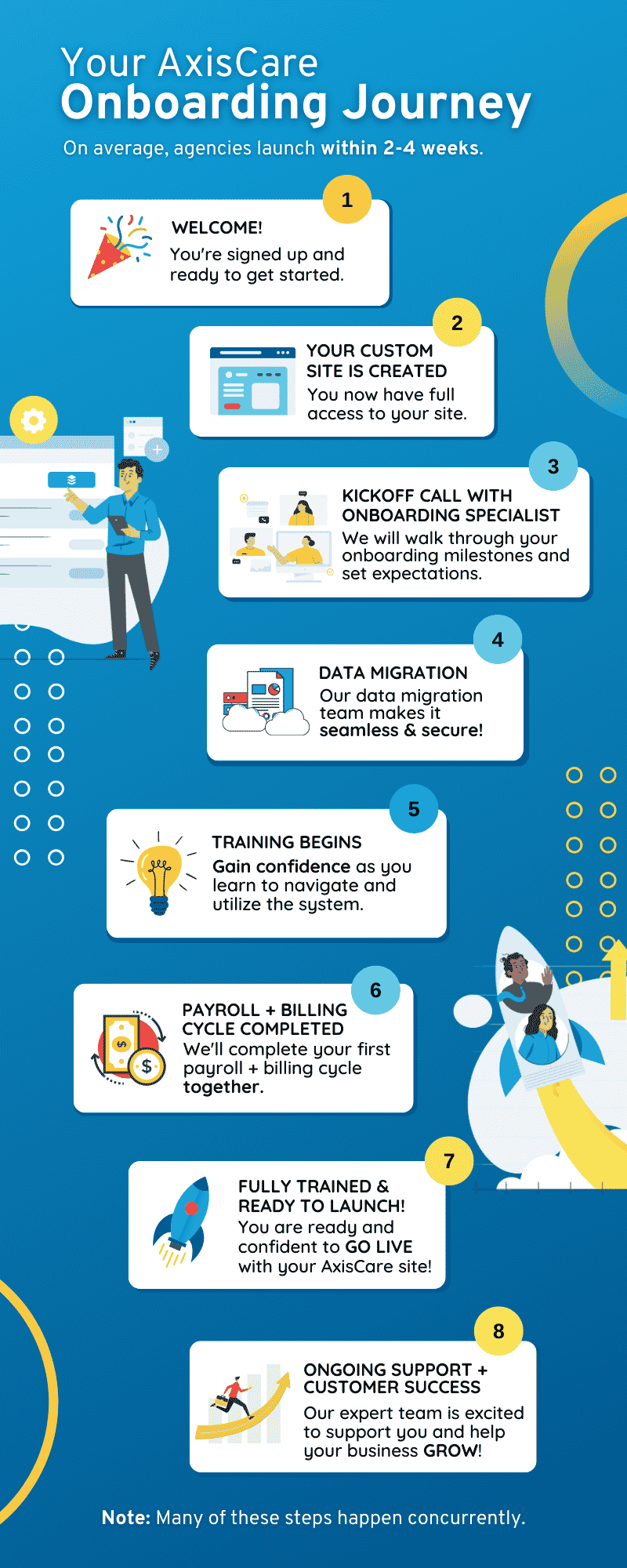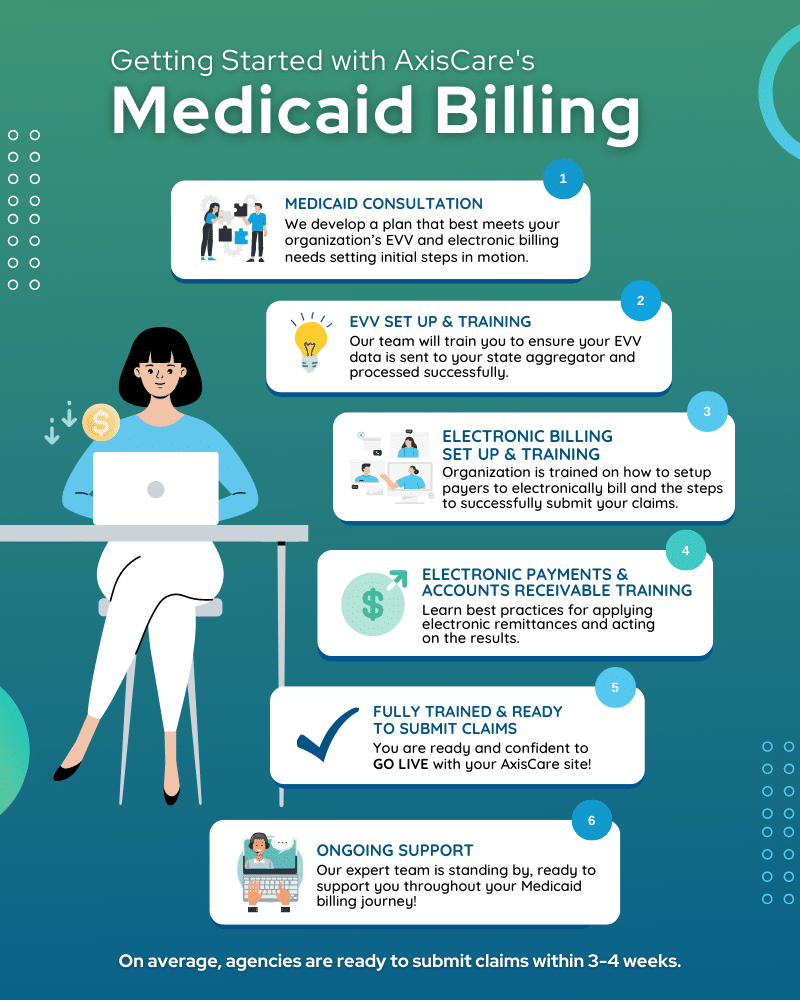Within a few short years, nearly every corner of the economy has been shaped in some
way by artificial intelligence. And while its ubiquity raises some questions surrounding
workforce impact and ethics, its benefits are undeniable when implemented strategically
and responsibly.
In home care, AI has already become a valuable tool for improving client experiences,
cutting down on caregiver admin, and helping agency operations flow more smoothly.
From streamlined scheduling processes to deeply personalized care plans, this piece
will cover AI’s transformative power in the home care industry.
Smarter Communication With AI Chat Assistants
The most beneficial uses of AI are ones that complement and enhance humans’ abilities
– not replace them entirely. Chat assistants, for example, act as a “right hand” for
support agents, helping them quickly query large quantities of data for more informed
decision-making and effective client tracking.
Employees can ask a question and immediately receive answers based on
up-to-the-minute data instead of spinning their wheels with guesswork or endlessly
clicking through files. These precise, personalized experiences keep teams organized,
on-task, and focused on client care instead of tedious research.
What’s more, agencies can specify which roles are able to access different types of
information, keeping sensitive information protected and delivering the exact information
support staff need without the fluff.
AI Scheduling That Works for Everyone
Home care schedulers are responsible for some pretty intricate matchmaking. Each
shift assignment must take into account caregiver availability and skills, coupled with
clients’ needs and preferences. Their routes must also be optimized for efficiency – you
can’t have caregivers driving across town for every appointment – and incorporate any
specialized skills that might be required, like dementia care.
AxisCare’s AI-powered scheduling tool takes all of these data points into account, then
uses an algorithm to map out the most effective lineup for each employee. It
incorporates information like acceptable driving distance, preferred weekly hours, skills,
overtime, schedule history, and even preferences such as pet allergies to yield a perfect
match every time. If a shift is left unassigned, AI will identify the gap and find a caregiver
immediately, leading to fewer missed visits and a reduced administrative load for busy
schedulers.
When the right caregiver is matched to the right client, satisfaction goes both ways:
individuals receive support that is perfectly tailored to their needs and employees are
placed in situations that support their success by aligning with their strengths.
AI also removes any bias from the matchmaking process. For example, a human
scheduler may favor a caregiver they know and trust, or someone whose skills they’re
more familiar with. An algorithm will only consider the straight facts, optimizing
exclusively for fit and seeking to evenly distribute hours across the roster.
Predictive Analytics & Client Care Summaries for Better Outcomes
While neither humans nor AI can tell the future, algorithms can crunch enough data to
forecast how certain issues might play out. Known as predictive care analytics, this
process helps prevent critical issues from being looked over, improves responsiveness,
and enables families and administrators to make better care decisions.
Based on a huge bank of client information, AI is able to identify and track client
concerns over time to understand the most likely outcomes for different scenarios. It
leaves no stone unturned, taking into account every possible data point to pinpoint
when clients’ conditions are at risk of worsening – including the risk of hospitalization.
Predictive analytics give caregivers a leg up by facilitating proactive care,
recommending interventions before situations become dire and helping them make
well-informed care decisions based on empirical evidence. It also provides
administrators with actionable insights, summarizing the overall effectiveness of their
interventions and highlighting areas for improvement.
Enhancing the Caregiver Experience
Home care agencies are up against a lot when it comes to keeping caregivers happy.
Unpredictable schedules, intense interpersonal situations, meager pay – these
challenges are part and parcel with this line of work. But AI can go a long way toward
weaving balance into caregivers’ hectic days, reducing feelings of overwhelm and
alerting HR teams when an employee may be at risk of burning out.
As discussed above, AI-powered scheduling prevents lopsided workloads from
overburdening some caregivers while underworking others. By sticking to preferred
work hours and avoiding favoritism, these algorithms keep assignments fair and
balanced to reduce the risk of burnout.
Similarly to predictive analytics, AI can monitor caregiver feedback to identify early
warnings of disengagement, prompting managers to offer personalized support for
individuals and reevaluate their policies if the same flags are raised over and over
again.
Algorithms can also pinpoint opportunities for recognition, reminding caregivers that
their work is valuable and offering rewards for loyalty or exceptional service. For
example, it can scan client feedback for words associated with praise or send reminders
for certain work milestones like years served, ensuring every opportunity is duly
celebrated.
How AI Is Transforming the Future of Home Care
No matter how embedded AI becomes in home care operations, it will never replace the
human touch – there is simply no substitute for empathy. The entire healthcare industry
is stretched thin for resources, and AI is able to give precious time back to overwhelmed
systems that want to deliver more personalized care but simply don’t have the means.
By taking care of time-consuming tasks, AI boosts caregiver and client satisfaction in
one fell swoop. With the help of technology, care teams can shift their attention from
admin and paperwork to compassionate service that only a human can deliver. On the
receiving end, clients can enjoy more face time with their caregivers and more
personalized interventions as enabled by algorithm-supported care plans.
Take the Next Step: AI Solutions Designed for Home Care Agencies
AxisCare Intelligence is a full suite of tools that helps agencies take a quantum leap
into the future of home care. From chat assistants that keep agency staff informed and
proactive to scheduling tools that intelligently assign shifts, our platform is tailor-made
for care organizations that want to achieve operational excellence while empowering
their teams to deliver outstanding service.
Care analytics leave no stone unturned, helping teams flag issues before they escalate
and ensuring important information is addressed promptly. Agencies can enjoy these
deeper insights without the need to crunch more paperwork, unlocking greater
efficiencies without any additional administrative burden.
Want to learn more about how our technology can support your agency’s success?
Request a live demo with our team!









